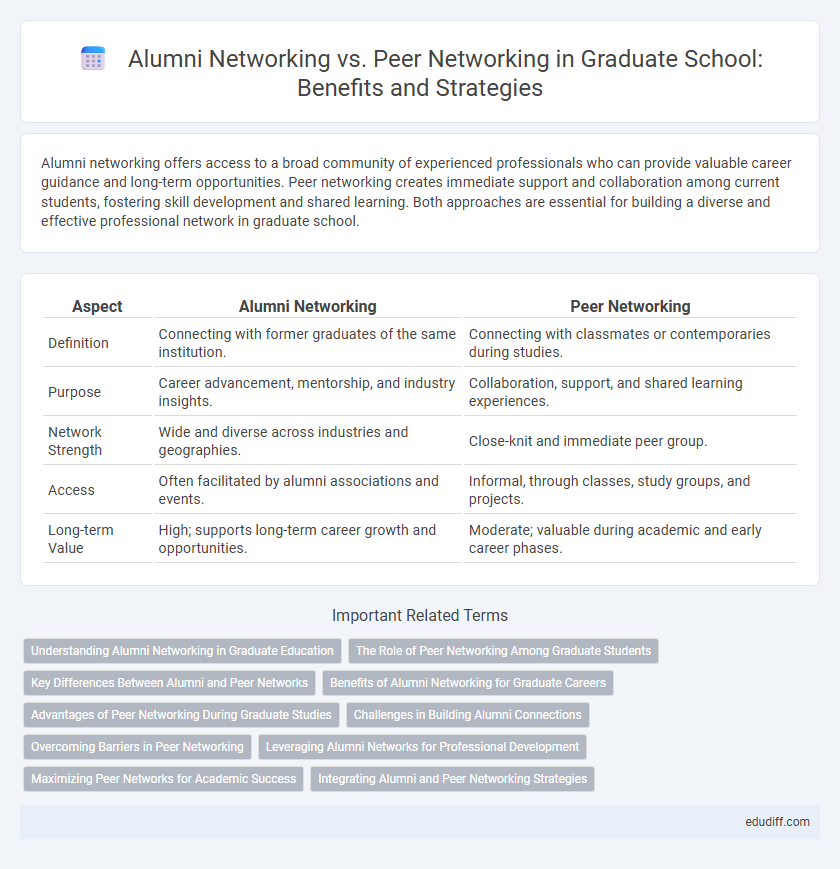Alumni networking offers access to a broad community of experienced professionals who can provide valuable career guidance and long-term opportunities. Peer networking creates immediate support and collaboration among current students, fostering skill development and shared learning. Both approaches are essential for building a diverse and effective professional network in graduate school.
Table of Comparison
| Aspect | Alumni Networking | Peer Networking |
|---|---|---|
| Definition | Connecting with former graduates of the same institution. | Connecting with classmates or contemporaries during studies. |
| Purpose | Career advancement, mentorship, and industry insights. | Collaboration, support, and shared learning experiences. |
| Network Strength | Wide and diverse across industries and geographies. | Close-knit and immediate peer group. |
| Access | Often facilitated by alumni associations and events. | Informal, through classes, study groups, and projects. |
| Long-term Value | High; supports long-term career growth and opportunities. | Moderate; valuable during academic and early career phases. |
Understanding Alumni Networking in Graduate Education
Alumni networking in graduate education leverages the shared institutional experience and professional achievements of former graduates to create valuable mentorship and career advancement opportunities. It fosters connections that extend beyond academic collaboration, providing access to a broad spectrum of industries and established professionals. Engaging in alumni networks enhances career trajectories by facilitating job placements, internships, and industry insights tailored specifically to a graduate's field of study.
The Role of Peer Networking Among Graduate Students
Peer networking among graduate students fosters collaborative learning, emotional support, and professional development by connecting individuals with shared academic goals and challenges. This form of networking encourages the exchange of ideas, resources, and research opportunities within a close-knit community, enhancing problem-solving and innovation. Unlike alumni networking, peer networks provide real-time feedback and immediate collaboration crucial for academic success and skill-building during graduate studies.
Key Differences Between Alumni and Peer Networks
Alumni networking involves connections among graduates from the same educational institution, offering access to an extensive network of experienced professionals and industry leaders, while peer networking consists of building relationships with current classmates or colleagues, providing real-time collaboration and mutual academic or career support. Alumni networks typically leverage long-term shared experiences and institutional loyalty to facilitate mentorship, job placement, and business opportunities. In contrast, peer networks emphasize immediate exchange of knowledge, resources, and emotional support during concurrent academic or professional stages.
Benefits of Alumni Networking for Graduate Careers
Alumni networking provides graduate professionals with access to a diverse and experienced community, offering valuable industry insights and mentorship opportunities often unavailable in peer networking. This network facilitates connections to exclusive job openings and career advancement resources by leveraging established alumni relationships. Engaging with alumni enhances professional credibility and opens doors to long-term collaborations that significantly boost career growth prospects.
Advantages of Peer Networking During Graduate Studies
Peer networking during graduate studies fosters collaborative learning and enhances problem-solving through shared academic challenges. Engaging with peers cultivates immediate access to diverse perspectives and real-time feedback, accelerating personal and professional development. This network often leads to lasting professional relationships that can support career growth beyond graduation.
Challenges in Building Alumni Connections
Building alumni connections presents challenges such as limited access to updated contact information and varying engagement levels among graduates. Alumni networks often face difficulties in maintaining sustained communication due to geographic dispersion and diverse career paths. Peer networking tends to be more immediate and interactive, while alumni networking requires strategic initiatives to foster long-term relationships and mutual support.
Overcoming Barriers in Peer Networking
Overcoming barriers in peer networking involves addressing challenges such as limited access to diverse professional circles and lack of confidence in initiating connections among graduates. Effective strategies include creating structured networking events tailored to specific fields and leveraging digital platforms that facilitate ongoing communication and collaboration. Enhancing peer networking skills can lead to stronger support systems and expanded career opportunities beyond traditional alumni networks.
Leveraging Alumni Networks for Professional Development
Leveraging alumni networks provides graduates with access to a diverse group of experienced professionals who offer valuable industry insights, mentorship opportunities, and job referrals. These connections facilitate long-term career growth by connecting graduates with individuals who share a common educational background and can provide tailored advice. In contrast, peer networking primarily supports immediate academic collaboration and early career exchanges, while alumni networks enhance strategic professional development over time.
Maximizing Peer Networks for Academic Success
Maximizing peer networks enhances academic success by fostering collaborative learning, diverse perspectives, and real-time support among graduate students. Active engagement in study groups, research collaborations, and peer mentoring builds a strong foundation for knowledge exchange and problem-solving. Leveraging these peer connections cultivates critical thinking skills and increases opportunities for academic growth and innovation.
Integrating Alumni and Peer Networking Strategies
Integrating alumni and peer networking strategies amplifies career opportunities by combining experienced professionals' insights with current peers' fresh perspectives. Leveraging alumni connections offers access to industry expertise and mentorship, while peer networks provide real-time academic collaboration and support. A cohesive networking approach enhances knowledge sharing, job referrals, and professional growth beyond graduation.
Alumni Networking vs Peer Networking Infographic

 edudiff.com
edudiff.com